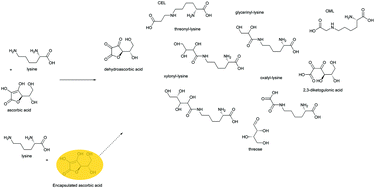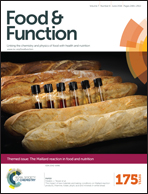Encapsulation of ascorbic acid promotes the reduction of Maillard reaction products in UHT milk
Abstract
The presence of amino groups and carbonyls renders fortified milk with ascorbic acid particularly susceptible to the reduction of available lysine and to the formation of Maillard reaction products (MRPs), as Nε-(carboxyethyl)-L-lysine (CEL), Nε-(carboxymethyl)-L-lysine (CML), Amadori products (APs) and off-flavors. A novel approach was proposed to control the Maillard reaction (MR) in fortified milk: ascorbic acid was encapsulated in a lipid coating and the effects were tested after a lab scale UHT treatment. Encapsulation promoted a delayed release of ascorbic acid and a reduction in the formation of MRPs. Total lysine increased up to 45% in milk with encapsulated ascorbic acid, while reductions in CML, CEL and furosine ranged from 10% to 53% compared with control samples. The effects were also investigated towards the formation of amide-AGEs (advanced glycation end products) by high resolution mass spectrometry (HRMS) revealing that several mechanisms coincide with the MR in the presence of ascorbic acid.

- This article is part of the themed collection: The Maillard reaction in food and nutrition

 Please wait while we load your content...
Please wait while we load your content...